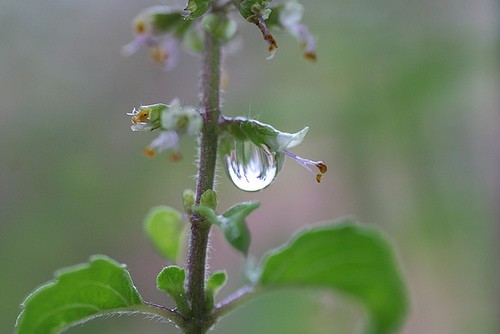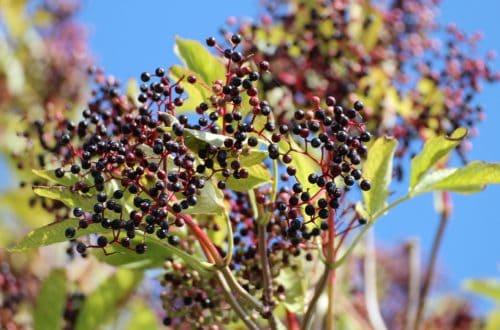This post may contain affiliate links. Read the disclosures for more information.
A Sacred Plant
The Tulsi plant, also known as Holy Basil, has such a special name for a good reason. This plant (Ocimum tenuiflorum or Ocimum sanctum) is native to the Indian subcontinent where it well-respected. There are two different varieties with two different spiritual names – Rama Tulsi and Krishna Tulsi. Tulsi grows wild in India and most families have it growing in their gardens or in their patio. It is believed to provide divine protection; the name Tulsi means “Incomparable One”. It is in fact a cousin of the basil many of us love in Italian cooking, and both of them are part of the mint family. This variety produces beautiful delicate purple flowers, and sometimes has leaves with a purple tint.
Traditional Uses
In Ayurvedic Medicine, Tulsi is used to treat, coughs, colds, flus, and it is believed to make the body pure and light. The woody stalks are often used to create meditation beads. Holy basil is also known as the “anti-stress” herb because of its powerful anti-oxidant properties that protect the cells from the damages of stress and aging. Holy basil can also be particularly beneficial for helping the body unwind from a stressful day, it is also good for the lungs, asthma, allergies, and can protect the heart and help lower inflammation.
Western Uses
From another view point, Holy Basil is classified as an adaptogen, which means that it helps the body regulate stress hormones like cortisol and adrenaline. Stress and high cortisol levels can lead to many other problems, including inflammation, autoimmune disorders, digestive disorders, weight gain, infertility, leaky gut, anxiety, depression and more. High cortisol levels can wreak havoc on the whole body. Having a plant like Holy Basil as an ally to help lower cortisol levels is extremely valuable, and this can help prevent many other problems down the road.
Holy basil contains vitamin A, C and anti-oxidants that protect the body from free radicals and other cellular damage, and also helps the body get rid of toxins. It also has demonstrated anti-cancer effects and can help modulate the immune system which is overall extremely beneficial for everyone.
The Science
In a literature review of 24 studies on Tulsi, this plant was found to be extremely safe, as well as beneficial for blood pressure, glucose levels, lipid levels and managing stress (1). In addition, studies have shown that it has powerful anti-microbial properties, supporting the traditional use of this herb for healing colds and flus. A compound called Eugenol is thought to be largely responsible for the healing benefits of tulsi.
Practical Uses
I generally recommend that people who are looking to sleep better, improve fertility, and generally de-stress should drink Tulsi tea throughout the day. Unlike its Italian counterpart, while you could cook with it, it is not especially known for its use in cooking and it is best taken in tea form. You can purchase Tulsi tea here or at your local supermarket. I recommend buying the simple Tulsi tea. Tulsi has virtually no side effects and is extremely safe to add into your wellness routine.
The Sound of Holy Basil
I would like to offer some musical accompaniment to this post. Please enjoy this music as you enjoy a cup of Holy Basil / Tulsi tea.





